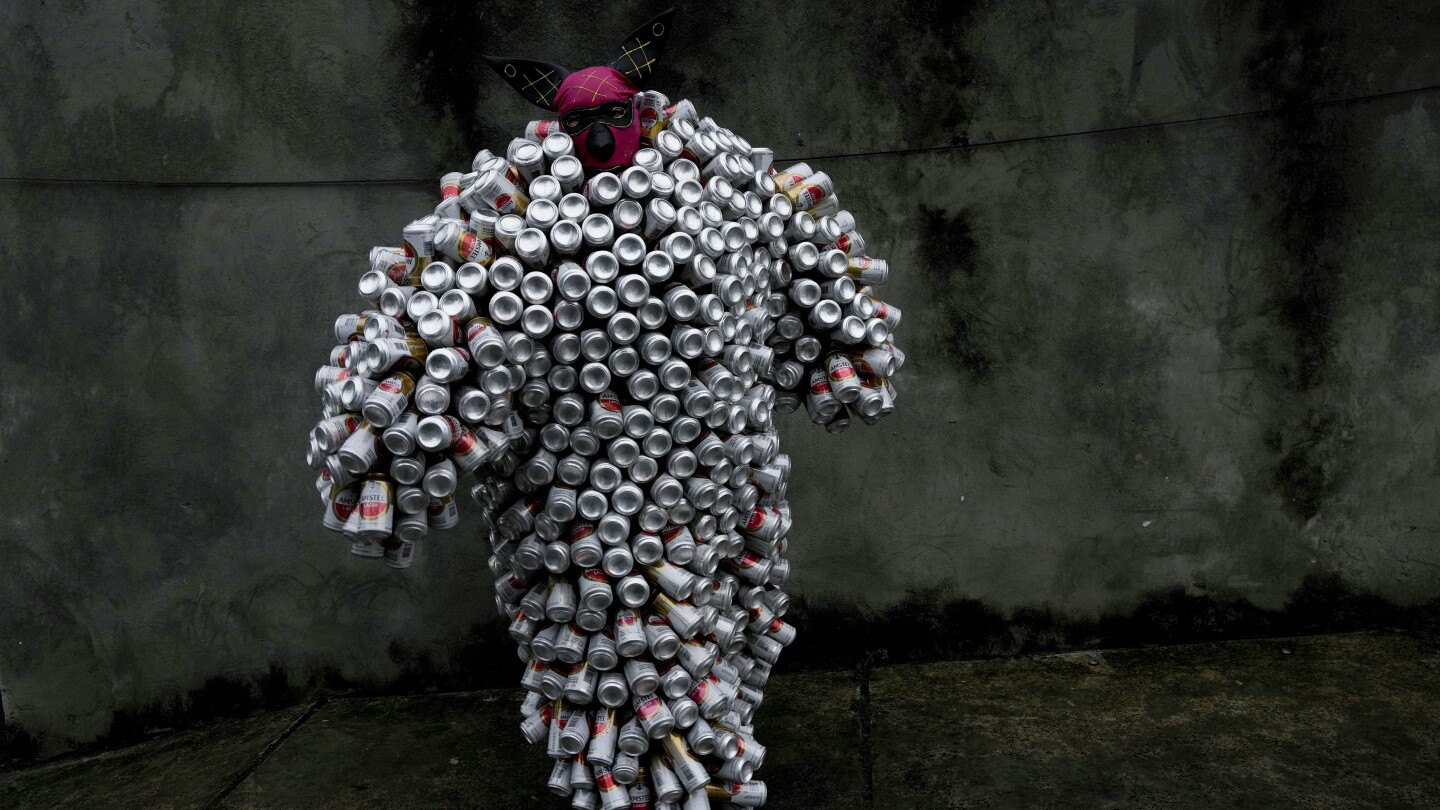MADRE DE DEUS, Brazil (AP) — They couldn’t see it, but they could hear it.
Carnival revelers Sunday in northeastern Brazil ‘s Madre de Deus heard the aluminum can street party before spotting it: More than 30 paraders decked out in cumbersome outfits made from hundreds of beer and soda cans clanged their way around the island in Bahia state’s Bay Of All Saints.
Each costume — called a “pierro” — is the result of arduous work, made from approximately 1,600 cans gathered over the course of the previous months, then thoroughly washed to dispose of lingering odors.
Hundreds of joyful onlookers gathered despite a summer drizzle to watch the feast for the eyes and ears, cheering on and applauding the much-loved ‘bloco da latinha’ as it is known in Portuguese.
“In addition to being beautiful, it’s really fun,” said Fábia do Carmo Carvalho, 19, who has been parading with the group for several years.
First founded in 1997, the street party was born out of concern with the sea of cans that Carnival leaves in its wake, littering Madre de Deus. A group of friends and family began gathering discarded cans and attaching them to their clothing.
But a few years down the line, collecting recyclable materials became a regulated profession, whereby people can take materials to recycling centers and receive a salary based on the weight and quantity of material collected.
While Madre de Deus suddenly became much cleaner, as a result the group struggled to find cans. The can street party was paused before returning in 2011, with performers for the first time decked out in “pierros.”
“Nine people came out. It was clumsy, there were no masks. From then on, we started to improve bit by bit. And thank God, here we are now,” said president of the group Aloísio Jesus da Silva, 62, on the morning of the parade at his house.
The cans, regrouped by color and type, are attached with a small nylon wire to overalls. This year, performers wore a red mask covering their faces with pointy black ears. Some women chose to parade in an alternative model, with just a skirt made of cans and shoes decorated with tabs.
The group received a huge boost when they were invited by the television network Globo to participate in the program ‘Heat up!’ in 2015. The elaborate costumes take up too much space to be transported across the country to Globo’s studios in Rio de Janeiro, so the network assisted them with making new ones for the show.
“Appearing on a national channel was very important for the development of the group. It was a validation of what they do,” said Louyse Gerardo de Medeiros, who is a doctoral student at Portugal’s Minho University in cultural studies and wrote her master’s thesis on the group.
“The experience — during which they were very well received — contrasts with their day-to-day life, which is a struggle,” Medeiros said.
As the popularity of the group has increased, so has the need for aluminum cans to make extra costumes. The street party now pays people who collect recyclable material for a living to sell them cans.
Costumes work out to approximately 220 reals ($44) – a non-negligible amount, in a country where the monthly minimum wage stands at $285.
“Every year it’s very difficult,” said Ednailton Santos, 59, vice president of the group. They would like to be sponsored, “but no one listens to us,” he said.
Despite the difficulties, Santos is a proud member of the street party and the message it carries for both young and old inhabitants of Madre de Deus.
Santos earns a living as a fisherman and spends many hours at sea off Bahia state’s coastline. “I see people drinking and throwing their cans in the sea. I catch them and bring them back to shore,” he said.
“We show people that the can they threw away has a lot of prestige, because with it we make a costume that brings a lot of happiness,” Santos said.

